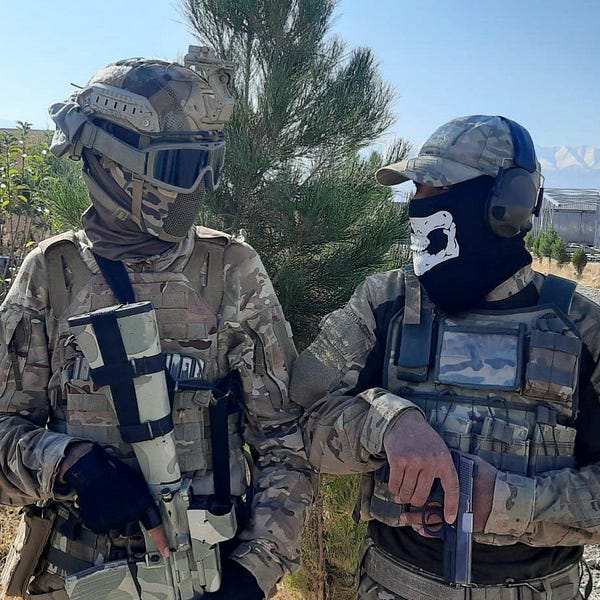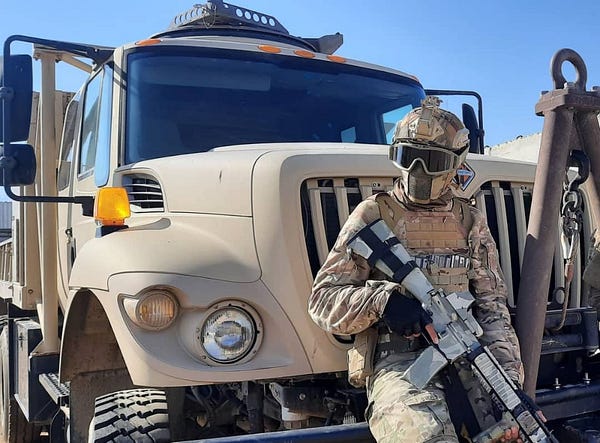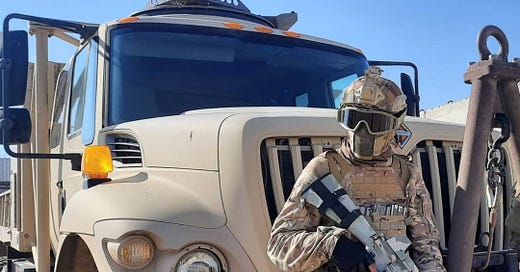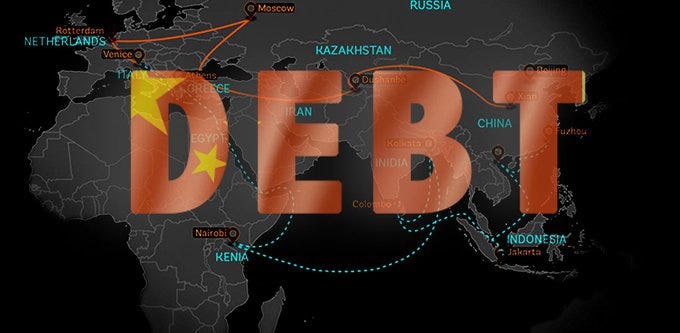Islamic State
Anti-China narratives have gained increased traction in the Islamic State (IS) movement’s discourse in recent years, which has only accelerated and been championed by the group’s South Asia branches. The late October meeting between Chinese Foreign Minister Wang Yi, the Afghan Taliban’s Acting Deputy Prime Minister Mullah Abdul Ghani Baradar, and their respective delegations evoked intense and widespread derision by online Islamic State supporters. They accuse the Taliban of being “prostitutes,” of pandering to Beijing in order to gain official recognition, and of selling out and betraying Uyghur Muslims in Xinjiang. Pro-Islamic State media network Al-Mursalat was still sharing edited images of the meeting as recently as November 12th.
Other notable propaganda content from recent weeks includes imagery and messaging accusing Saudi Arabia of supporting China’s oppression of Xinjiang Muslims and criticism of Pakistani politicians for their silence on the plight of the Uyghurs.
For more on the Islamic State movement’s response, check out my latest article for Eurasianet:
Islamic State using China to vilify Taliban: Since the Taliban took Kabul, Islamic State sympathizers across South Asia have increased attacks on the movement over its ties to China
I also recommend Riccardo Valle’s Twitter thread on the IS reaction to the Doha meeting:


Afghanistan
The Turkistan Islamic Party’s (often referred to as ETIM) presence in Afghanistan is a subject of public concern for Beijing, and the Taliban government is under pressure to prevent Uyghur militants from using Afghan territory to launch attacks against Chinese interests. Speaking to the Daily Telegraph, a former senior security official in President Ashraf Ghani’s administration claimed “We had 35 ETIM militants in jails all over Afghanistan. All of them escaped after the Taliban takeover.”
The TIP’s media apparatus has refrained from posting content showing their fighters in Afghanistan since the Taliban took Kabul in mid-August. However, in late October a TIP-linked Instagram account posted images of what are assumed to be its militants posing with weapons in front of Navistar Defense vehicles. The pictures drew considerable attention, and the account subsequently removed the photos.





Tajikistan
There has been some notable reporting on China’s expanding international security footprint in recent weeks. In mid-October, RFE/RL’s Reid Standish wrote about Chinese activity at its “unofficial military base” in Tajikistan near the Afghan border.
A follow-up article notes that “Tajikistan has approved the construction of a new Chinese-funded base near the country’s border with Afghanistan,” and “in a separate development, the Tajik government has offered to transfer full control of a preexisting Chinese military base in the country to Beijing and waive any future rent in exchange for military aid from China.”

Pakistan
Armed Baloch separatist groups have persistently targeted government security forces and Chinese interests in Pakistan. On November 11th, the Baloch Republican Army (BRA) claimed responsibility for attacks on “occupying Pakistani forces” stationed at security outposts protecting the China-Pakistan Economic Corridor (CPEC). A few days prior, the BRA had released a 10-minute video showing a series of assaults against “occupying forces on the so-called CPEC security route.”
Philippines
The outlawed Communist Party of the Philippines (CPP) has continued to criticize China’s growing international influence as well as its alleged aggression and violation of Philippine national sovereignty. One of the CPP’s main social media accounts accused Beijing of engaging in debt trap diplomacy and posted an image depicting the Belt and Road Initiative (BRI) as predatory.
You can read my Militant Wire article on the CPP’s recent media releases warning about the adverse impact of China-US great power competition on the Philippine people:
Nigeria
Nigeria announced the deployment of 60 newly acquired armored personnel carriers provided by the Chinese government. The equipment is intended to bolster the Nigerian military’s war efforts against jihadi insurgents and bandits.





Islamic State supporters on Telegram denounced the transfer but speculated that jihadi forces in the region will soon capture the vehicles in battle.
Mali
As China expands its economic footprint across Africa, Chinese businesses face heightened operational risk posed by militants, criminal elements, and pirates. In July, three Chinese nationals working for the COVEC construction company were kidnapped by armed gunmen. On November 1st, Malian security forces rescued the captives after they managed to escape. It remains unclear — at least publicly — who is responsible.
US Department of Defense China Power Report
The United States Department of Defense recently published its report on the ‘Military and Security Developments Involving the People’s Republic of China’ for the fiscal year 2020. The document describes how the “growth of the PRC’s global economic footprint also makes its interests increasingly vulnerable to domestic political transitions in participating countries, international and regional turmoil, terrorism, piracy, and serious natural disasters and epidemics, which places new requirements on the PRC to address these threats.” According to the DOD, the “PRC is seeking to establish a more robust overseas logistics and basing infrastructure to allow the PLA to project and sustain military power at greater distances” and “has likely considered Cambodia, Myanmar, Thailand, Singapore, Indonesia, Pakistan, Sri Lanka, United Arab Emirates, Kenya, Seychelles, Tanzania, Angola, and Tajikistan as locations for PLA bases or military logistics facilities.” They add that the “PRC has probably already made overtures to Namibia,” and “known focus areas of PLA planning are along the SLOCs from China to the Strait of Hormuz, Africa, and the Pacific Islands.”
Be sure to check out our new research platform Militant Wire: Read our work at militantwire.com and follow @MilitantWire on Twitter










